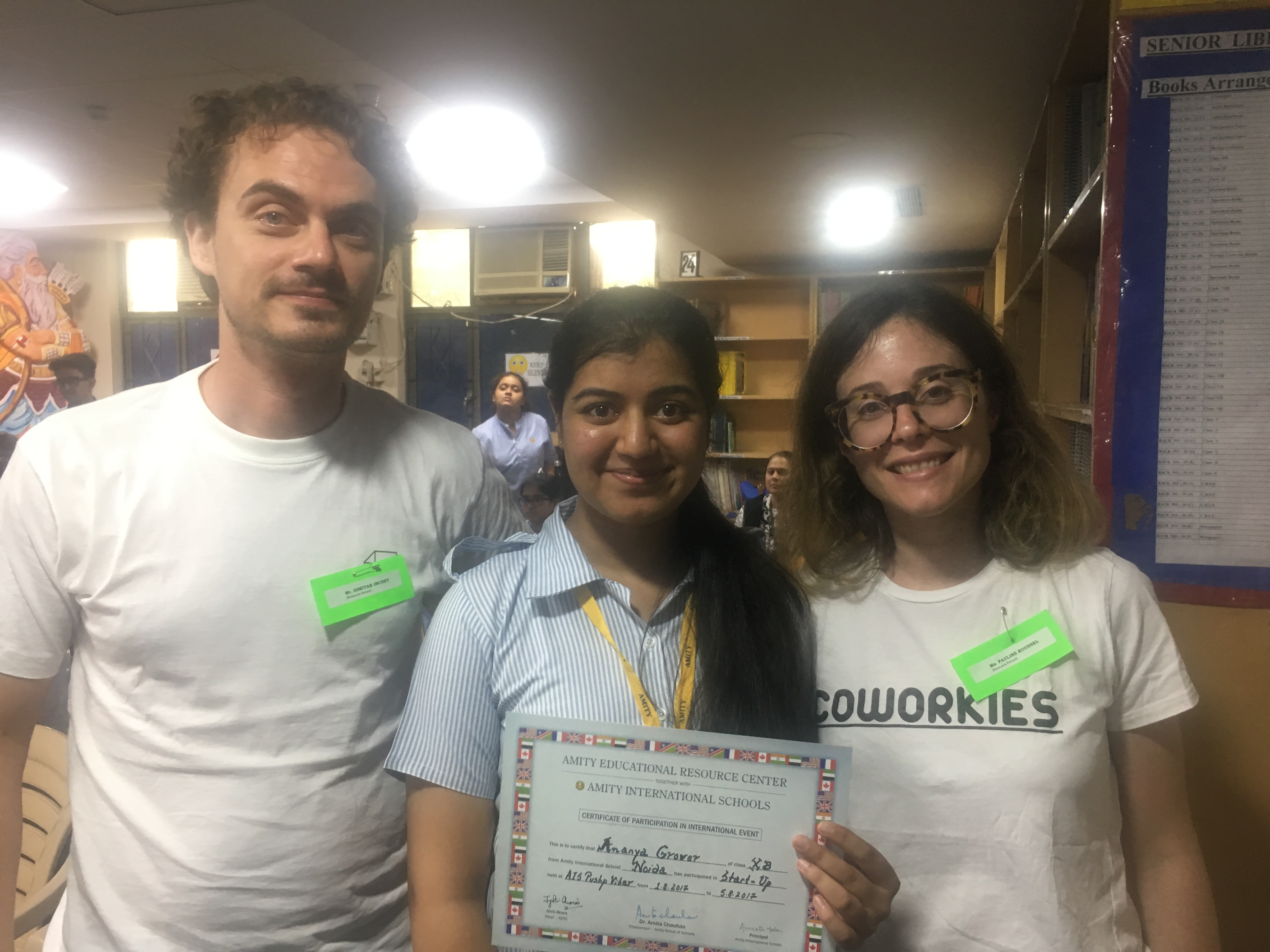An entrepreneur and Co-founder of Coworkies, a future work company, Pauline Roussel has visited over 150 coworking spaces in 17 cities. She recently visited New Delhi along with fellow co-founder Dimitar Inchav and took a five-day startup camp for Amity students. Here, she talks to Ananya Grover of Class 10-B about freedom in the personal and professional sphere by sharing her experiences and ideas. Can unconventional workplaces and careers offer freedom?
What exactly are coworking spaces and how are they different from a traditional office?
Co-working spaces are work environment focused on building communities. They differ from a traditional office in the sense that they gather more several types of professionals from startups to freelancers and corporates for instance.
You’ve travelled all around Europe and even in Indian metropolises and seen so many coworking offices: Are they all the same? Or is everyone’s idea of the concept different?
The concept of coworking is the same all over the world but the way to do it and the maturity between cities is very different. Europe seems to be a more mature market for co-working as it started more than 10 years ago. In India, it is still a relatively new trend, which is booming across the country.
Were you able to work more efficiently in a coworking environment? Also, do you think every type of person benefits from this environment or are some suited for conventionally structured workplaces?
Efficiency at work is difficult to compare from a coworking space to a regular office in the sense that it’s not about being more or less efficient but rather to be more or less connected to your work environment. In coworking spaces, you have the possibility to meet an incredible amount of people either they are your coworkers but also people who come to attend events for instance. You can extend your professional network very easily.
I do believe everyone can benefit from coworking spaces. The most important part is to want to benefit from it. Some people just want a place to work and some other are seeking the community. Coworking can bring you all of that.
What motivated you to leave your regular jobs and start something of your own?
I have always wanted to start something someday but did not find the opportunity until Coworkies. After being the General Manager of a coworking space in Berlin for 2 years, I realized that something could be improved in the way people connect in coworking spaces. I kept it in the back of my mind without really knowing what to do about it until the day I met my co-founder who started to talk about the same opportunity. We decided to team up and build our own startup.
Do you think entrepreneurship gives you freedom?
It does give you the freedom to start something of your own, with your own vision and passion.
You suddenly become your “own” boss so you do have a lot of freedom in the way you structure your days and your company.
Now that you have experience working in both non-conventional workplaces and in a non-conventional occupation (as an entrepreneur), do they go hand-in-hand? Are they completely different experiences?
Coworking spaces are flexible workspaces that are well-suited for entrepreneurs.
The vast majority of coworking offers are for a month so you don’t have to sign a 3 years lease if your startup does not work. In that regard, I would say they go hand-in-hand.In general, I think coworking spaces are a great environment to experience whatever the job you are doing. You need to go there with a purpose and with the will to connect with like-minded individuals.
Some students these days choose not to pursue further studies but want to start something of their own. In your opinion, is it better to get a degree, work a normal 9-5 job, get experience, and then start up? Or is directly jumping in fine?
It is very difficult to answer this question with a personal opinion. I think everyone needs to find their own way through life and listen to their gut feeling. Not everyone is made for a 9-5 job and not everyone is made to be an entrepreneur, but you learn that once you try it! So what I would rather say is: try things out and if one fails you can always decide to either come back to school or quit your 9-5 job to become an entrepreneur. You have nothing to lose and all of life to learn.
What does freedom mean to you as a citizen of a country that is part of a multinational alliance (EU)? Do you feel, as some do, that that limits how free your country is?
A lot of Europeans do not measure how lucky they are to have the freedom to live their lives the way they want. I The EU gives us the freedom to travel across countries, the freedom to study, the freedom to decide for ourselves, and the freedom to be the person we want to be. Of course, we have limits on our freedom that are regulated by the countries we live in. You can agree or disagree with those rules but in general, they are meant to keep the country safe and stable.
What does freedom mean to you as individuals?
I guess for me freedom means that I can speak up and decide for myself. I have the freedom to decide for my life.
Would you like to say something to students our age?
I like this!Don’t be afraid to fail! Failure is the best way to learn and grow personally and professionally.

